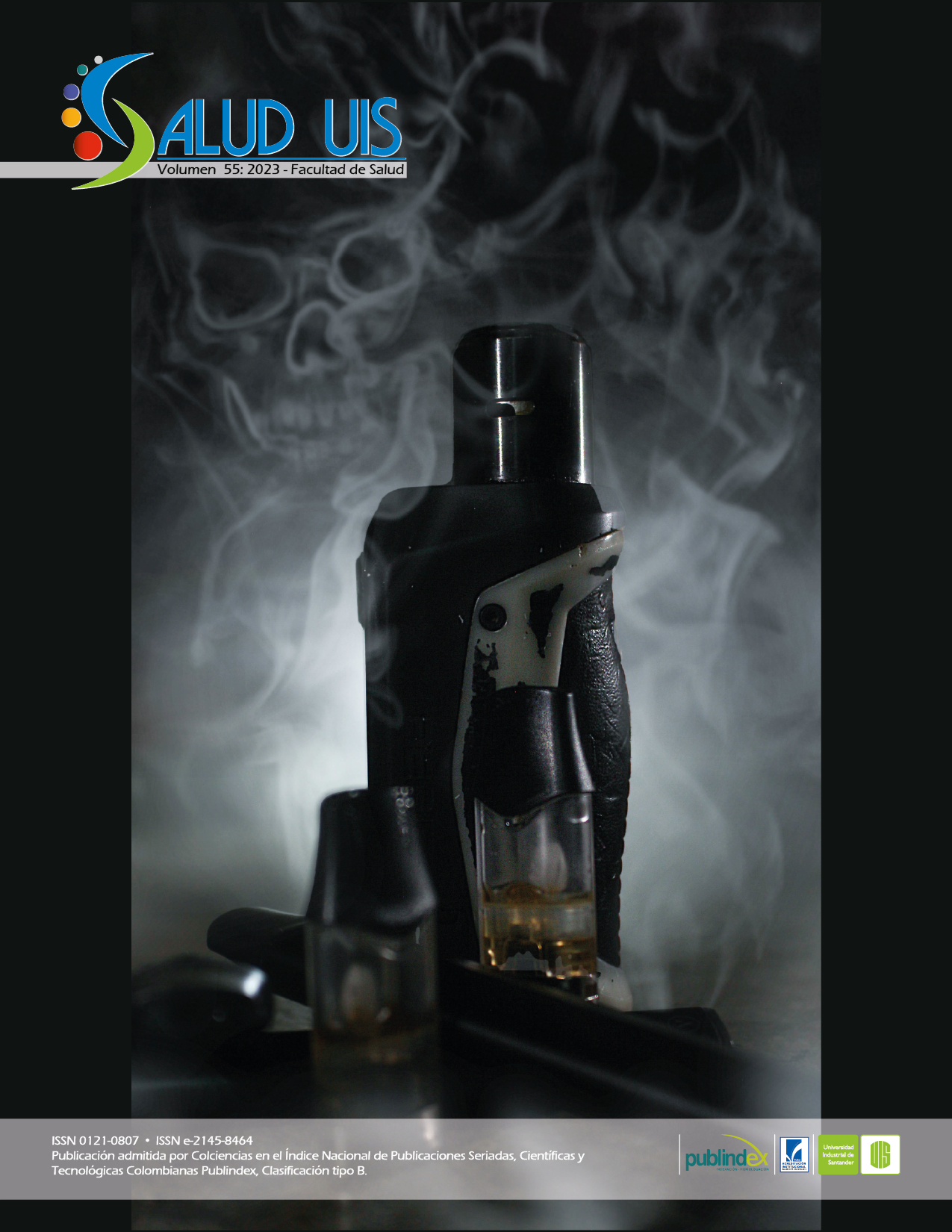Abstract
Introduction: Menopause is a stage, although normal, of profound changes in a woman’s life. The transition to menopause imposes a challenge on the nursing professional, aimed at promoting health, facilitating the transition and supporting the search for a solution to the needs that arise. Objective: The present study is aimed at understanding the meanings of menopause in women from Armenia, Quindío Department, Colombia. Metodology: A qualitative, phenomenological and interpretative approach was used, based on Meleis’s theory of transitions. In-depth interviews were carried out on six women from Armenia, with prior informed consent, with intentional sampling, recording, and field diary; the information was analyzed with support of the ATLAS.ti database, through coding, inductive categorization, triangulation, and comparison with the literature. Results: A negative perception of menopause was found due to hot flashes, restlessness, depression and sexual dysfunction; for the symptoms they resort to complementary therapies and medication, as a result, some report a calming and pleasant experience; health accompaniment networks are urgently needed for promotion and prevention, and family support. They request specific educational programs from an early age. Discussion. The results coincide with the literature regarding the experience of the participants and the need for support and guidance. From Meleis’s theory, the transition is developmental, organizational, with multiple, simultaneous and related patterns. The experience was felt and lived negatively, spaces for analysis, reflection and accompaniment are needed from an early age, to deconstruct the concept of menopause and climacteric as a health problem, and address it as a vital and rebirth event, as an opening to a new way of living, with healthy lifestyles. Conclusions: It is concluded that the menopause is perceived and experienced as a stage of anxiety, restlessness, sadness and hopelessness, due to the lack of accompaniment, poor education and preparation of women; “menopausal” adult women are little recognized, rejected and, many times, only tolerated by close people. Health support networks are urgently needed.
References
Johnson A, Roberts L, Elkins G. Complementary and alternative medicine for menopause. J Evid Based Integr Med. 2019; 24: 1-14. doi: https://doi. org/10.1177/2515690X19829380
Santoro N, Roeca C, Peters BA, Neal-Perry G. The menopause transition: Signs, symptoms, and management options. J Clin Endocrinol Metab. 2021; 106(1): 1-15. doi: https://doi. org:10.1210/clinem/dgaa764
Curta, JC, Weissheimer, AM. Perceptions andfeelings about physical changes in climacteric women. Rev Gaucha Enferm. 2020; 41(spe): e20190198. doi: https://doi.org/10.1590/1983- 1447.2020.20190198
Urdaneta J, Cepeda M, Guerra M, Baabel N, Contreras A. Calidad de vida en mujeres menopaúsicas con y sin terapia de reemplazo hormonal. Rev Chil Obstet Ginecol. [Internet]. 2010; 75(1): 17-34. doi: http:// dx.doi.org/10.4067/S0717-75262010000100004
Çelik AS, Pasinlioğlu T. Effects of imparting planned health education on hot flush beliefs and quality of life of climacteric women. Climateric. 2017; 20(1): 25-30. doi: https://doi.org/10.1080/13 697137.2016.1249839
Prior R, Pina F. El logro de la madurez femenina: la experiencia del climaterio en un grupo de mujeres. Enferm Glob. 2011; 10(23). doi: https://dx.doi. org/10.4321/S1695-61412011000300022
Schumacher KL, Jones PS, Meleis AI. Helping elderly persons in transition: A framework for research and practice. Scholarly Comm. 1999; Disponible en: https://repository.upenn.edu/nrs/10
Im EO. Afaf Ibrahim Meléis: Teoría de las transiciones. En: Modelos y teorías de enfermería. 7 edición (Alligood MR, Tomey AM). Elsevier, Barcelona. 2011; 416-433. 809 Pp.
Im EO, Meleis AI. A situation-specific theory of Korean immigrant women’s menopausal transition. J Nurs Sch. 1999; 31(4): 333-338. doi: https://doi. org/10.1111/j.1547-5069.1999.tb00513.x
Eyimaya AÖ, Tezel A. The effect of nursing approaches applied according to Meleis’ Transition Theory on menopause-specific quality of life. Health Care Women Int. 2021; 42(1): 107-126. doi: https:// doi.org/10.1080/07399332.2020.1825440
Fuster DE. Investigación cualitativa: Método fenomenológico hermenéutico. Propós. Represent. [online]. 2019; 7(1): 201-29. doi: http:// dx.doi.org/10.20511/pyr2019.v7n1.267
Belardo MA, Starvaggi A, Cavanna MM, Pilnik S. Estrategias no farmacológicas para el manejo de los síntomas vasomotores en la menopausia. Rev Peru Ginecol Obstet. [Internet]. 2018; 64(1): 61-67.
Mintziori G, Lambrinoudaki I, Goulis DG, Ceausu I, Depypere H, Erel CT, et al. EMAS position statement: Non-hormonal management of menopausal vasomotor symptoms. Maturitas. 2015; 81: 410–413. http://dx.doi.org/10.1016/j. maturitas.2015.04.009
Cobin RH, Goodman NF, on behalf of the AACE Reproductive Endocrinology Scientific Committee. American Association of Clinical Endocrinologists and American College of Endocrinology Position Statement on Menopause–2017 Update. Endocrine Practice. 2017; 23(7): 869-880. https://doi. org/10.4158/EP171828.PS
Hickey M, Szabo RA, Hunter MS. Non-hormonal treatments for menopausal symptoms. BMJ. 2017; 359: j5101. https://doi.org/10.1136/bmj.j5101
Hunter MS, Ayers B, Smith M. The hot flush behavior scale: A measure of behavioral reactions to menopausal hot flushes and night sweats. Menopause. 2011; 18(11): 1178-1183. doi: https:// doi.org/10.1097/gme.0b013e318219d791
Briñez KJ. Narrativa de enfermería: visión y patrones de conocimiento en una entrevista en el hogar. Rev Col Enferm. 2019; 142-148. doi: https:// doi.org/10.18270/rce.v9i9.574
Heredia B, Lugones M. Edad de la menopausia y su relación con el hábito de fumar, estado marital y laboral. Rev Cub Obstet Ginecol [Internet]. 2007; 33(3).
Bisognin P, Alves CN, Wilhelm LA, Prates LA, Scarton J, Resse LB. El climaterio en la perspectiva de las mujeres. Enferm. Glob. [Internet]. 2015; 14(39): 155-167.
Vargas AJ, Leal EH, Castillo MF, Restrepo OI, Zambrano ME, Plazas M. Percepción de la menopausia y la sexualidad en mujeres adultas mayores en dos hospitales universitarios de Bogotá, Colombia, 2015. Rev Col Obstet Ginecol. 2016; 67(3), 197-206. doi: https://doi.org/10.18597/ rcog.767
Lopera-Valle JS, Parada-Pérez AM, Martínez- Sánchez LM, Jaramillo-Jaramillo LI, Rojas-Jiménez S. Calidad de vida en la menopausia, un reto en la práctica clínica. Rev Cub Med Gen Integr. 2016; 32(3): 1-11.
Martínez-Garduño MD, Olivos-Rubio M, Gómez- Torres D, Cruz-Bello P. Intervención educativa de enfermería para fomentar el autocuidado de la mujer durante el climaterio. Enferm Univ [Internet]. 2016; 13(3): 142-150. doi: https://doi.org/10.1016/j. reu.2016.04.001

This work is licensed under a Creative Commons Attribution 4.0 International License.
Copyright (c) 2023 Carmen Ayde Fernández-Rincón, Adíela Henao Henao-Buritica, Nancy García, Bayron Manuel Ruiz-Hoyos, María Beatriz Escobar-Escobar
